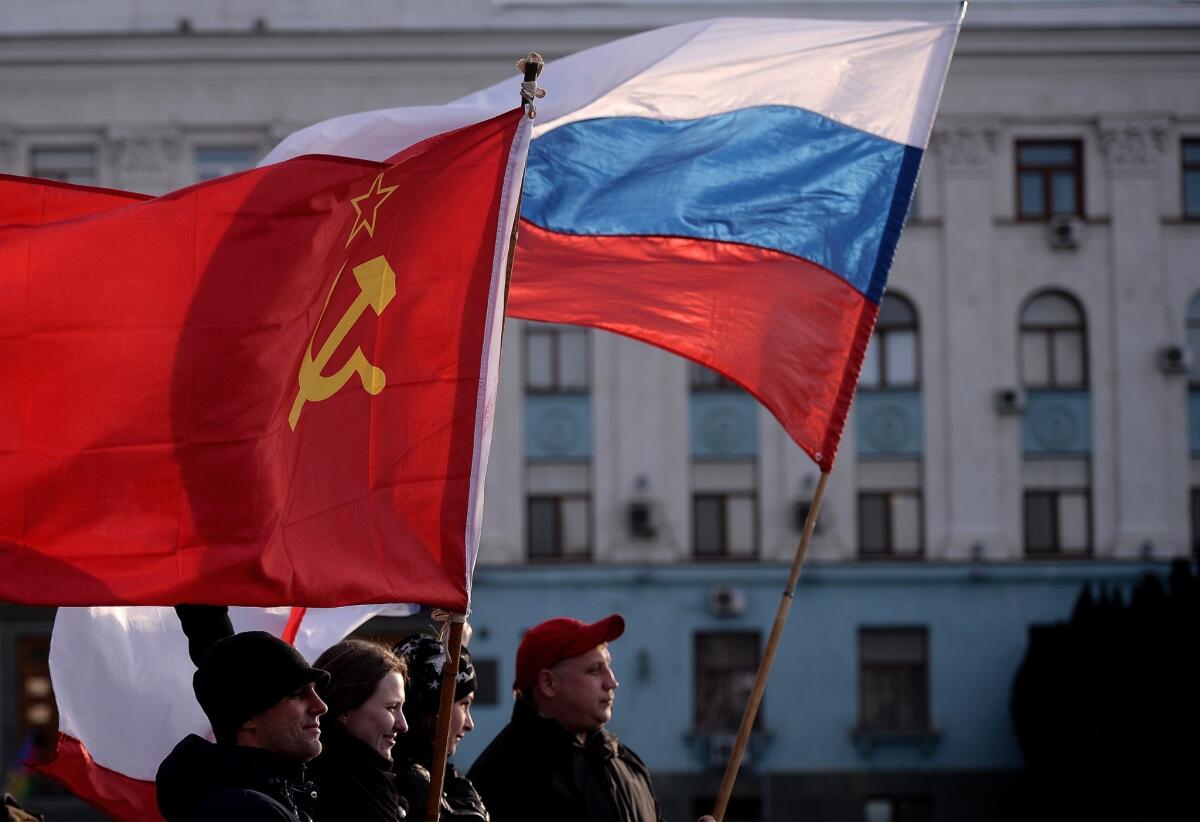Crimean voters go to the polls to decide future of Ukrainian region

PEREVALNE, Ukraine — Crimean voters went to the polls Sunday to decide whether to end their decades-long ties to Ukraine in a referendum rejected as illegal by the nation’s leaders in Kiev and most Western powers.
Balloting was being carried out under the watchful eyes of Russian forces and pro-Russia militia who largely seized control of the peninsula late last month.
“The referendum will pass the way the Crimean people choose and it will be inexorable and categorical,” Sergei Aksenov, the region’s new pro-Russia premier, wrote Sunday in his Twitter account before the polls opened. “Crimea will become part of Russia.”
By early afternoon, Aksenov had declared the referendum valid, saying that the turnout reached about 50%.
“Tomorrow we will hold Crimean [parliament] session which will endorse the referendum results,” Aksenov said in televised remarks. “The program of the autonomy’s development is being already elaborated today with our Russian colleagues.”
The voting Sunday morning appeared quite active not only in Simferopol, the regional capital, and Sevastopol, where Russia has long leased facilities to base its Black Sea fleet, but in rural areas as well.
A majority of residents in the region, which was part of Russia until 1954, speak Russian and are expected to support the move toward eventual annexation by Russia, one of the two options on the ballot. The other option would call for staying part of Ukraine but with expanded autonomy.
Russian songs blasted over loudspeakers placed at the entrance of a polling station in a small town of Perevalne, about 16 miles south of Simferopol, as voters carrying umbrellas against a sudden wet snowstorm arrived to cast their ballots.
Some voters saw the referendum as a chance to reverse Crimea’s inclusion in Ukraine, which gained its independence with the collapse of the Soviet Union in 1991.
“I have been looking forward to this moment for the last 23 years and now my dream is finally coming true,” Yelena Gavysheva, a 59-year-old pensioner told The Times. “Now we will reunite with our real motherland and our salaries and pensions will grow among other things.”
“I am sick and tired of the constant government changes in Kiev and I don’t want the political violence to come here,” said Natalia Lapyrina, 30, a primary school psychologist. “Russia will certainly protect us from fascist radicals coming here from [Ukraine’s] west.”
Moscow cited political turmoil in Kiev, the Ukrainian capital, as justification for largely seizing control of the peninsula. Ukraine’s pro-Russia president, Viktor Yanukovich, fled the country last month after three months of protests against his government, and Russia has insisted that the country’s new rulers are not legitimate.
Some of Crimea’s residents oppose what has been widely seen as the inevitable result of the referendum, and many of them boycotted the balloting.
Crimean Tatars, who still remember their forceful deportation and exile by Josef Stalin in 1944, mostly stayed home.
“We have all agreed to boycott the referendum as we want to go on living in Ukraine, where human rights and freedoms are much more respected than in Russia,” Memet Eminov, a 46-year-old ethnic Crimean Tatar and a bus driver, told The Times in his home in Perevalne. “We realize that most likely Russia will grab Crimea now and we can only pray that there’s no war.”
Not far from his home and about 300 yards from the polling station, Russian armored vehicles and soldiers wearing masks and holding guns were still surrounding a Ukraine army unit which continued to reject Russian demands to surrender weapons and leave the unit’s territory.
The Russian military, it appeared, had other plans than to pack and go home after the referendum, a Russian soldier who gave his name only as Sergei implied.
“This is not the end,” he said. “What about [Ukraine eastern regional centers] Kharkiv, Donetsk, and what about Kiev? We can’t leave them to fascists.”
Sergei explained that he and his comrades were wearing white bands on their arms after receiving a warning that Ukrainian troops might dress in the same uniforms and attack their positions.
In the meantime, on the Black Sea coast near the resort city of Feodosia, Russian soldiers besieging a Ukraine marine base were observed setting up about 40 anti-tank mines around the perimeter of the unit, said Alexei Mazepa, Ukraine Defense Ministry’s spokesman.
“As of Monday when they announce the results of the referendum, Crimea’s new authorities and the Russian military will consider our army and navy units they are blocking now an alien armed contingent and may step up their pressure all the way up to direct armed attacks,” Mazepa said.
Ukraine acting President Olexandr Turchinov called Crimean referendum “a provocation by the Kremlin” which violates Ukraine’s Constitution.
“It false from beginning to end and its results will not reflect the real moods in the autonomy,” Turchinov said in a statement posted on the president’s official website Sunday. “We must understand that its results have already been painted in the Kremlin, which at least needs some grounds to official deploy troops in our lands and begin a war which will destroy human fates and the economic prospects of Crimea.”
More to Read
Start your day right
Sign up for Essential California for news, features and recommendations from the L.A. Times and beyond in your inbox six days a week.
You may occasionally receive promotional content from the Los Angeles Times.






